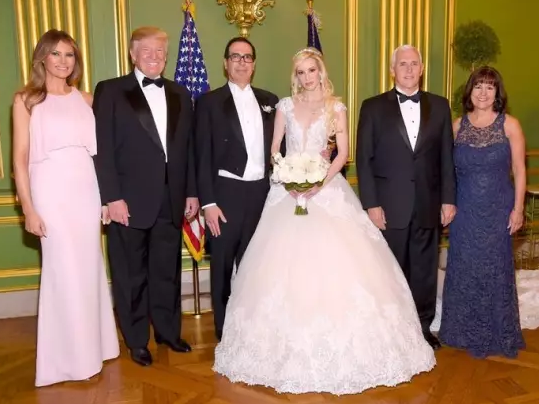
--The Right Way to Brag on Instagram--
Louise Linton, wife of Treasury Secretary Steven Mnuchin, raised ire this week with an Instagram post depicting herself descending the steps of a government jet accompanied by the caption, “Great #daytrip to #Kentucky! #nicest #people #rolandmouret pants, #hermesscarf, #tomford sunnies, and #valentinorockstudheels #valentino #usa.”
本周,美国财政部长史蒂文·努钦(Steven Mnuchin)的妻子露易丝·林顿(Louise Linton)在社交媒体Instagram上引起公愤。她晒出了自己在机长陪同下走下公务专机的照片,并写道“#肯塔基的愉快#短途出行!#人们#非常亲切#罗兰·穆雷长裤,#爱马仕丝巾,#汤姆·福特墨镜,以及#华伦天奴铆钉高跟鞋 #华伦天奴 #美国”。

| Louise Linton发在推特上的图片
In the photos, the 36-year-old Scottish actress, who grew up in a castle and married Mr. Mnuchin, a multimillionaire, earlier this year, is clad in what appeared to be approximately $16,000 of luxurious cream wool crepe designer clothing and opulent accessories, which she dutifully tagged for any Real Americans currently in the market for thousand-dollar white pants.
这位苏格兰女演员现年36岁,从小在城堡里长大,今年早些时候嫁给了亿万富翁姆努钦。照片上她身着价值约1.6万美元的奢华乳白羊毛绉绸名牌服装,满身配饰珠光宝气;她负责地一一标注这些商品,为想买几千美元白色长裤的“真正的美国人”提供参考。
Several Instagram commenters pointed out that, in a country where an estimated 43 million people live below the poverty line and 6.4 million children live with food insecurity, flaunting ostentatious wealth at least partially supported by taxpayer money goes beyond tackiness and approaches sadism.
好几位Instagram网友在评论中指出,美国目前约有4300万人生活在贫困线以下,640万儿童的食品没有保障,而林顿如此炫耀至少部分是由纳税人的钱换来的财富,这种行为已非低俗可以形容,而是近乎变态。
One user wrote: “Glad we could pay for your little getaway. #deplorable.” Added another: “Please don’t tag your Hermes scarf. Distasteful.”
有位网友写道:“我们很高兴为你的短途旅行埋单。#可耻。”还有人回复道:“请别给你那爱马仕丝巾加标签。没品味。”

| Hermes scarf
In response, Ms. Linton posted a vertiginous wall of text suggesting that rich people are nobler and more self-sacrificing than poor people because they pay a lot of taxes, the tone implying that perhaps the serfs of Instagram would appreciate her scarf more if they weren’t so dung-caked.
对此,林顿回复了一大篇令人眼花缭乱的文字,暗示富人比穷人更高尚,更勇于自我牺牲,因为富人交了很多税;言下之意,Instagram上的这些草民如果不是土得掉渣,也许就会更欣赏她的丝巾了。
When Ms. Linton’s response, which contained the lines “Aw” and “Your life looks cute,” didn’t garner the ecstatic genuflection of the common people as expected, she made her account private. She later apologized, calling the post and her response “inappropriate and highly insensitive.”
林顿的回复里还有“哟”、“你的生活看起来真可爱”等词句。然而这段回复并未如她所料,引来老百姓的欢呼膜拜。于是,她把账号设成了私密状态。后来她又公开道歉,说自己的贴子和回复“不适当而且完全不顾他人感受”。
This, of course, is one of the classic social media bungles! Who hasn’t inadvertently posted an innocent outfit of the day that comes across as more stuck up than aspirational? Who can keep all this millennial etiquette straight when your Borzoi just spilled emeralds all over your laptop?
当然,这是一次典型的社交媒体错误操作!谁没有过不经意发了当日造型,结果没显得高端大气,反而被认为是高傲自大呢?你的俄国狼狗把绿宝石撒得笔记本电脑上到处都是的时候,谁还顾得上遵守这些千禧世代的礼仪?
Well, great news for busy public-service-minded citizens on the go: We’ve compiled an easy guide to help you show off your #shoegoals without implying that you’re #abetting a #violent #racist #kleptocracy. Just have your calligrapher transcribe it and you’re ready to ’Gram!
好消息,事务繁忙、一心为公的公民请注意:我们推出以下简易指南,教你如何炫耀你的#必买美鞋,还不会显得你是一个#暴力、#种族主义的#盗贼政权的帮凶。只需让你的誊写员抄写一遍这篇指南,你就可以到Instagram上尽情炫富去了!
DO: Share your good fortune! True friends take joy in one another’s successes, and the worldwide web is a great place to tell your fans and loved ones about your well-deserved windfalls and actualized dreams.
➤要:分享你的好运!真正的朋友能为彼此的成功感到由衷高兴,万维网特别适合向你的粉丝和挚爱展现你应得的横财和成真的美梦。
DON’T: Lay it on too thick. Instead of a florid tableaux in which you look like Khaleesi stooping to scatter millet for the teeming indigents of Slaver’s Bay to snarl and grub over, try a cute Starbucks selfie that shows off your new hat. Less is more. #hatgoals
➤不要:过分张扬。与其营造一幅华丽图景,让你看起来像是卡丽熙,屈尊为奴隶湾的遍地饥民抛撒小米,供他们哄抢,不如在可爱的星巴克自拍里晒出你的新帽子。少即是多。#必买美帽

DO: Express appreciation for the gifts the universe has given you.Less attitude, more gratitude.
➤要:为宇宙赐予你的礼物表达感激之情。少一点傲娇,多一点感恩。
DON’T: Express entitlement to United States government funds for decadent pleasure tours you, with your immense wealth, could easily afford yourself because America’s delusional obsession with rugged individualism deters voters from pushing for an overhaul of the tax code that might mitigate our staggering income disparity! Instead, maybe say “#blessed,” with a picture of your cold-pressed juice.
➤不要:有些豪华旅游你凭借自己的巨大财富就可以支付得起,不要因为美国人痴迷于粗糙的个人主义,导致选民不会去推动那些可能缩小我们的收入差距鸿沟的税制改革,就表现出你花政府的钱天经地义!不如写“#有福气”再配上冷榨果汁的照片。
DO: Build your personal brand.
➤要:打造你的个人品牌。
DON’T: Build your personal brand around conspicuous consumption in a cultural moment when the political administration that employs your husband and supposedly represents the interests of the struggling Everyman is actively trying to distance itself from a hostile foreign oligarchy.
➤不要:在这个文化上的敏感时刻通过烧钱摆阔来打造你的个人品牌。此刻,你丈夫任职的政府号称代表所有努力打拼的普通人的利益,却正在努力拉开自己与一个敌对的寡头国家的距离。
DO: Use hashtags so that ’Grammers with similar interests can find your latest snaps. For instance, the hashtag #humble helps you connect with other users who like things that are #humble! Try it out!
➤要:善用标签,让Instagram上有相似兴趣的人能看到你的更新。例如,“#谦卑”能把你和其他喜欢“#谦卑”的用户连结起来!试试吧!
DON’T: Use hashtags to let ’Grammers know that your handbag costs more than they pay in rent in a year, particularly if you’re married to the cabinet official who could help make homeownership and true, substantive, generational financial stability accessible for the working class, but probably won’t! Instead, try something more relatable, like #selfcare under a picture of you standing next to a horse. (Best not to mention that you own the horse and also the copyright to the concept of horses.)
➤不要:用标签让Instagram用户知道你的手包比他们一年的房租还贵,特别是考虑到你的内阁高官丈夫明明有能力协助实现工薪阶层买得起房,获得一代人的、真正的、实实在在的财富稳定,但却很可能不会那么做!相反,试试用一些更平易近人的标签,例如在你站在马旁边的照片下加上“#照顾自己”。(最好别提那匹马是你的,以及马这个概念的版权归你所有。)
DO: Accept criticism with a smile and an open mind. Not everyone is going to “get” you, and that’s O.K. Every callout is an opportunity to either improve yourself or model grace under fire. We are all just students in this university called life.
➤要:用微笑和开放的心态接受批评。不是每个人都会懂你,这没关系。每一次诘问都是一个机会,或者让你改进自我,或者让你表现出临事不惊的大度。在生活这所学校里,我们都只是学生。
DON’T: Get defensive and telegraph the fact that you feel unmitigated disdain toward those who weren’t fortunate enough to be born into money, marry into more money, then have their moneyed partner luck into a cushy six-figure government job with perks such as private jets and trips to #Kentucky.
➤不要:开启防御模式,并流露出你多么鄙视那些不如你好运的人,他们没能像你一样生在富贵之家、嫁入豪门,而且有钱的配偶又幸运地捞到一个轻松且年薪六位数的政府公职,还附带福利,比如私人飞机,可以去“#肯塔基”旅行。

| Louise Linton与美国财政部长Steven Mnuchin的婚礼
Before you tell a stranger that her complaint about the nation falling into the hands of cartoon rich people who can’t even forcefully denounce the Confederacy is really just the jealous squalling of a loser with a bad life, stop and think: Is this public? Will people see this? Am I a member of a humane, collective society or a capsule of pure consciousness floating in the void? Next, force your butler to eat your iPhone.
陌生人抱怨美国已经落入了一群漫画式的富翁之后,甚至连强烈谴责南北战争中的南部邦联都做不到的时候,别急着反驳说这不过是她这种生活潦倒的人生输家的嫉妒心理,请三思:这里是公共场合吗?别人会看到我说的话吗?我是人道集体社会的一员,还是漂浮在虚空中的一股单纯的意识?然后,强迫你的男管家吃掉你的iPhone。
DO: Explore filters, which can hide imperfections and make sunsets pop!
➤要:尝试滤镜,美颜遮瑕,还能突显夕阳之美!
DON’T: Reveal your own deeply flawed filter on the world.
➤不要:暴露你自己有严重缺陷的世界观。
推 | 荐 | 阅 | 读
In 1923, the British novelist D. H. Lawrence offered a grim assessment of America and Americans: “All the other stuff, the love, the democracy, the floundering into lust, is a sort of by-play. The essential American soul is hard, isolate, stoic, and a killer. It has never yet melted.”1923年,英国小说家D·H·劳伦斯曾经对美国和美国人做出过颇为黑暗的论断:“所有其他东西:爱、民主、为了欲望的挣扎,都是表面现象。美国灵魂的本质是坚硬的、孤立的、冷酷的,是杀人者的灵魂。这种坚冰从未消融过。”
Lawrence’s observations of the American character did not draw upon deep wells of direct personal experience. When he wrote those lines, he had only been living in the United States for a bit more than a year and had spent much of that time among artists and the literati. But he was neither the first nor the last to make such an observation. Nearly 50 years ago, surveying both the wreckage of the 1960s and centuries of archives, the brilliant historian Richard Hofstadter acknowledged that “Americans certainly have reason to inquire whether, when compared with other advanced industrial nations, they are not a people of exceptional violence.”劳伦斯的论断并非来自丰富的个人经历。当他写下这段话时,他仅仅在美国居住了一年多,而且大部分时间里都混迹于艺术家和文学家之间。但他既不是第一个这样论述的人,也不是最后一个。大约五十年前,睿智的历史学家理查德·霍夫斯戴德通过审视60年代的惨痛经验和几个世纪以来的文档,得出了类似的结论:“同其他发达工业国家相比,美国人对暴力的崇尚是毋庸置疑的。”
The allegation that the American character is essentially murderous — or at least more murderous than that of other nations — still strikes a chord today. It’s not just the periodic invitations to violence that Republican presidential nominee Donald Trump has issued over the course of his campaign, most recently against his Democratic competitor Hillary Clinton. This summer’s headlines have also enumerated trauma after trauma. Eight members of a single family murdered in Ohio. Forty-nine dead in a mass shooting in Florida. Shootings by police claiming the lives of black Americans in Louisiana, Minnesota, and Maryland. Fatal shootings of police in Texas, Louisiana, and California. Breaking reports of horror follow one another fast enough to induce a kind of whiplash.美国精神在本质上是充满谋杀精神的,或者说比其他国家更富有谋杀精神美国精神在本质上是充满谋杀精神的,或者说比其他国家更富有谋杀精神,这一结论今天仍然令很多人点头赞同。共和党总统候选人唐纳德·特朗普在竞选过程中定期呼吁美国人使用暴力,最近一次呼吁针对的目标是民主党竞争对手希拉里·克林顿。不仅如此,今年夏天的媒体标题充斥着一次又一次的暴力事件: 俄亥俄州一家八口被谋杀;佛罗里达州大规模枪击事件导致49人死亡;路易斯安那州、明尼苏达州、马里兰州警察枪杀黑人;德克萨斯州、路易斯安那州和加利福尼亚州枪杀警察事件。暴力事件的特大新闻层出不穷,频率之高令人震惊。
Or consider the strenuousness with which each political party now routinely denies that Americans are inherently violent, a refrain that can begin to feel like protesting too much. In his final speech at the Republican National Convention last month, Trump bemoaned the “violence in our streets and the chaos in our communities” but, true to form, laid the blame on hordes of “illegal immigrants … roaming free to threaten peaceful citizens”; “brutal Islamic terrorism”; and the enabling of a Democratic president whom Trump has previously and unsubtly intimated isn’t really American himself..现在,两大政党不遗余力、例行公事般地否认美国人的暴力精神, 反而有点此地无银了。在上个月共和党大会的最后发言中,特朗普哀叹了“我们街上的暴力和社区中的混乱”,但是不出所料,他将责任归咎于“四处闲游威胁和平公民的非法移民”、“残酷的伊斯兰极端分子”,以及一个据他所说不算美国人的民主党总统 。
Democrats likewise tend to suggest that, for Americans, acts of violence are an aberration. Announcing a gun safety program in the wake of last December’s mass shooting in San Bernardino, California, President Barack Obama declared: “We are not inherently more prone to violence. But we are the only advanced country on Earth that sees this kind of mass violence erupt with this kind of frequency.” From this perspective, violence in America does not indicate anything “inherent” in the American character: It is about the presence of guns, the availability of which is a contingent and remediable matter of policy.民主党人也倾向于指出对于美国人来说,暴力行为是非正常的、不具代表性。奥巴马总统在去年12月加州圣伯蒂纳大规模枪击事件后宣布了枪支安全项目,他称:“我们并不是骨子里就更倾向暴力。但是我们是地球上唯一暴力事件如此频繁的发达国家。”从这个角度来说,美国的暴力问题并不代表美国精神:问题在于枪支的泛滥,而这一点是可以通过政策来解决的。
But what if there’s good reason to believe that being American has always involved a relationship of some kind to violence — whether as its victim, as its perpetrator, as a complicit party, or even as all of these at once. Rather than assuming, in Obama’s words, that Americans are “not inherently more prone to violence,” the country owes it to itself to finally try to consider the question directly.但是,如果我们有充分理由相信美国人本身就一直和暴力存在某种联系呢?——作为受害者、施害者、共犯、或者这三种身份的结合体。与其像奥巴马那样假设美国人“并不是骨子里就更倾向暴力”,这个国家应该为了自己而正视这个问题。
FBI agents investigate a damaged wall of the nightclub in Orlando, Florida, where a mass shooter, Omar Mateen, killed 49 people on June 12, 2016. How is violence quantified, and what are the benchmarks used to assess whether a given society’s level of violence is high or low, normal or exceptional? The general practice among researchers across numerous disciplines is to present yearly “intentional homicide” rates per 100,000 of a given nation’s population; crucially, these figures do not include deaths directly related to full-blown wars.如何量化暴力,如何衡量一个社会中的暴力是高或低、正常或非正常?纵览各个学科,研究人员的一般做法是借助于某个国家每10万人中的年度“谋杀犯罪率”,这一比率不包括全面战争直接造成的人员死亡。
The U.N. Office on Drugs and Crime (UNODC) compiles national figures for its reports, the most recent of which reflects data from 2012 and 2013. Per the UNODC, some 437,000 people were murdered worldwide in 2012, putting the average murder rate at 6.2 victims per 100,000 persons. But beyond that average figure, as you might expect, there is wide variation in terms of both individual nations and continents. Regionally, Central America and southern Africa both clock in at over four times the global average (more than 25 per 100,000), while Western Europe and East Asia are some five times lower than it. Within continents and regions, the variations can be stark. Thus, to take Africa as an example, the rate in Senegal is 2.8; Egypt, 3.4; Sudan, 11.2; and Lesotho, the highest, at 38. In Europe, Switzerland’s rate is 0.6; the U.K., 1; Finland, 1.6; Lithuania, 6.7; and Russia, the highest, at 9.2. The Americas show the widest variation: Canada’s rate is 1.6; Argentina, 5.5; Costa Rica, 8.5; Panama, 17.2; Mexico, 21.5; and Honduras, the highest in the world — at 90.4 per 100,000.联合国毒品与犯罪问题办公室负责收集各国数据编纂此报告,最新的是2012-2013年的数据。联合国毒品与犯罪问题办公室的数据显示,全世界范围内2012年有43万7千人死于谋杀,即每10万人中有6.2名受害者。但是如你所料,在此平均值之外,不同国家和大洲的平均值大相径庭。就地区来说,中美洲和南部非洲的比值高于世界平均值4倍(每10万人中超过25名受害者),西欧和东亚的平均值低于世界平均值5倍。在同一个大洲和地区内,各国平均值也大不相同。以非洲为例:塞内加尔2.8人,埃及3.4人,苏丹11.2人,莱索托最高-38人。在欧洲,瑞士0.6人,英国1人,芬兰1.6人,立陶宛6.7人,俄国最高-9.2人。美洲国家间的差别最大:加拿大1.6人,阿根廷5.5人,哥斯达黎加8.5人,巴拿马17.2人,墨西哥21.5人,洪都拉斯全世界最高每10万人中有90.4名受害者。
Against this backdrop, for the period of 2007-2012, the United States has averaged 4.9 homicides per 100,000 persons. America thus stands more or less shoulder to shoulder with Iran (4.1), Cuba (4.2), Latvia (4.7), and Albania (5). So much for the data on homicides tout court. The question then is whether or not to consider America’s standing among countries like these to be an aberration. Such states certainly aren’t in the same class as the United States in terms of development metrics like per capita GDP, and this fact tends to get cited by American politicians and political observers as prima facie evidence that something else (whether “terrorists” or guns) is skewing their country’s violence data, pushing it out of its allegedly more “natural” peer group — places like the Scandinavian states, the U.K., or Japan.相比之下,2007到2012年间,美国每10万人中有4.9人死于谋杀2007到2012年间,美国每10万人中有4.9人死于谋杀,同伊朗(4.1人)、古巴(4.2人)、拉托维亚(4.7人)和阿尔巴尼亚(5人)比肩。 显然,数据本身所说明的有限。真正的问题在于美国同这些国家排名类似,我们是否应视之为非正常。这些国家在经济发展(例如国民生产总值)上无法与美国相提并论,美国的政客和政治观察家经常利用这一点来证明其他因素(“恐怖分子”或者枪支)影响了美国的暴力犯罪数据,从而使得美国落后于自己的“同类国”,例如北欧国家、英国或者日本。
But while such comparisons may sound rigorous at first blush, they are often naively aspirational (at best) or deliberately deceptive and chauvinistic (at worst). Nowhere is this more blatant than in the context of the debate over guns. For example, many gun control advocates and supposedly objective analysts will condemn violence in the United States as abnormal by invoking comparisons to “developed” nations as defined by the Organization for Economic Cooperation and Development (OECD). Yet these comparisons will regularly exclude Mexico, which is not only an OECD member but also America’s third-largest trading partner and its unfortunate next-door neighbor. The reason given for this exclusion, as though self-explanatory, is “the drug war.” The annual U.S. market for illegal drugs may be well over $109 billion, and an estimated quarter-million guns may be trafficked to Mexican cartels from the United States in any given year, but inviting the contemplation of such queasy moral entanglements is apparently less politically expedient, and more offensive to patriotic amour-propre, than demanding why America can’t just clean up its act and be more like the places we feel it “should” resemble.这种比较乍听上去貌似有理,但实际上它们往好了说是幼稚盲目,往坏了说则是故意欺骗和充满沙文主义。这一点在枪支问题的辩论上表现得淋漓尽致。比如说,很多支持控枪的人士和貌似客观的分析人员将美国与其他经济合作与发展组织(OECD) 定义的发达国家相比,得出的结论是美国的暴力问题是非正常的。但是这种比较通常会将墨西哥排除在外,而墨西哥不仅是OECD成员,还是美国第三大贸易伙伴和美国可怜的邻国。他们以 “毒品战争”为由排除墨西哥。美国每年非法毒品市场总值超过1090亿美元,每年从美国非法走私到墨西哥毒品组织的枪支高达25万支。这些事实使人不得不思考其背后令人作呕的道德缺失,但那在政治上是不合时宜的,还会伤害美国人的爱国自豪,更方便的是去质疑美国为什么不能改变自己的行为,把自己变得更符合我们关于美国的理想。











